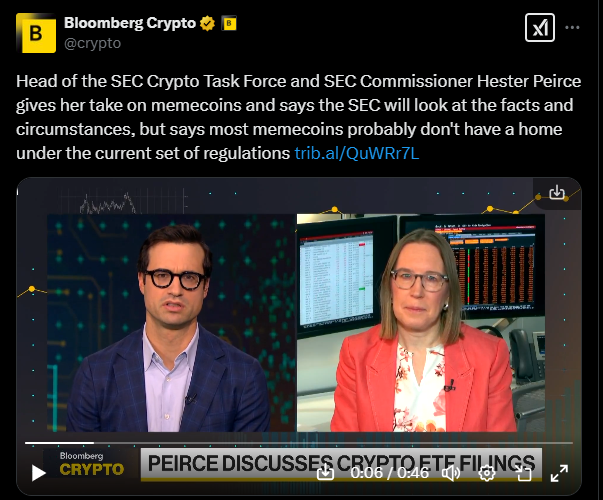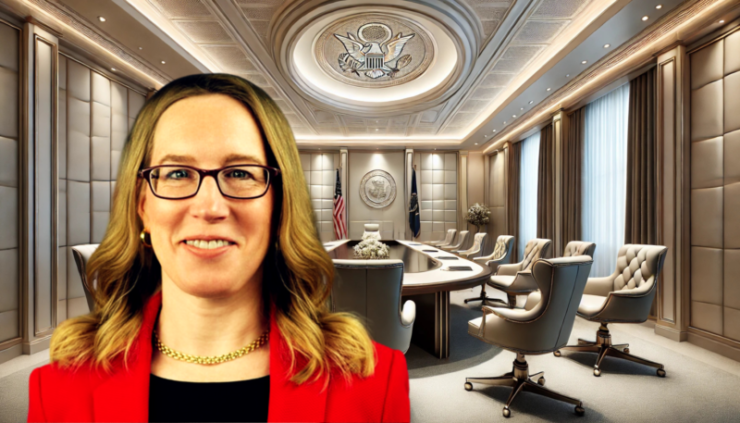Quick Stats
- SEC Commissioner Hester Peirce stated that most meme coins likely fall outside the SEC’s jurisdiction.
- Peirce emphasized that meme coins are driven by community trends rather than traditional investment principles.
- Memecoins like Bonk (BONK), Dogwifhat (WIF), and Official Trump (TRUMP) remain highly speculative, yet continue to attract massive trading volumes.
- The SEC’s future enforcement efforts are likely to focus more on fraud and clear violations, rather than expanding oversight into speculative crypto markets.
SEC Commissioner Hester Peirce has weighed in on the regulatory status of meme coins, stating that most of these tokens are unlikely to fall under the jurisdiction of the U.S. Securities and Exchange Commission (SEC). Speaking in an interview with Bloomberg, Peirce noted that while some meme coins could potentially be classified as securities, many operate in ways that do not meet the SEC’s legal framework for enforcement.
Peirce, who has long been seen as a pro-crypto voice within the SEC, emphasized that the legal standard for determining whether an asset qualifies as a security, may not apply to a significant number of memecoins. She suggested that either the U.S. Congress or the Commodity Futures Trading Commission could possibly address the issue of Memecoins regulation.
“There are lots of people introducing memecoins right now, facts and circumstances matter,” said Peirce.
“But many of the memecoins that are out there probably do not have a home in the SEC under our current set of regulations.”.
Peirce also acknowledged that meme coins are often driven by social media trends and community hype rather than traditional investment principles, making their classification under existing securities laws challenging.

SEC’s Crypto Task Force Aims for Clarity
Now leading the agency’s newly established crypto task force, Commissioner Peirce stated that the task force’s priority is to provide clarity on what crypto tokens should be considered “non-securities,” aiming to resolve regulatory ambiguity that has long frustrated industry participants. This shift in focus aligns with the Trump administration’s broader efforts to create a more innovation-friendly regulatory environment after years of legal battles between the SEC and crypto firms.
Under Gensler’s leadership, the SEC launched lawsuits against major crypto exchanges, including Binance, Coinbase, and Kraken, alleging unregistered securities offerings. Many of these companies pushed back, arguing that the SEC failed to provide clear regulatory guidelines, making compliance nearly impossible.
Peirce’s vision is fundamentally different—rather than relying on enforcement actions, her goal is to establish clear distinctions between securities and non-securities, reducing the need for future litigation.
Memecoins and Market Trends
The discussion around memecoin regulation comes as tokens like Bonk (BONK), Dogwifhat (WIF), and Official Trump (TRUMP) continue to dominate trading volumes. Despite their high volatility and speculative nature, these assets have captured a strong retail investor following.
With the launch of Solana’s easy-to-use Pump.fun launcher, meme coins surged in popularity throughout 2024, with some achieving market capitalizations in the billions of dollars due to viral trends and community-driven hype. Many industry analysts argue that meme coins should be viewed more as digital collectibles or entertainment assets rather than traditional investments.
Peirce’s comments suggest that the SEC may take a more hands-off approach toward meme coins, focusing its enforcement efforts on fraudulent schemes and deceptive practices rather than simply targeting speculative tokens.





